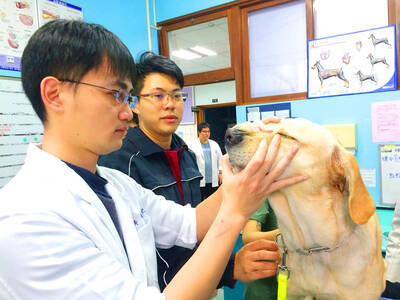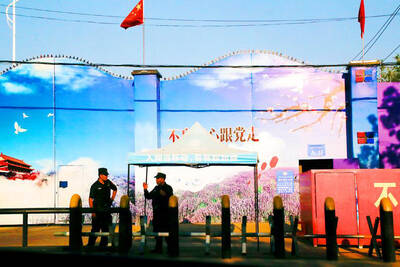China’s initial cover-up of the COVID-19 outbreak has further deepened the distrust between Taipei and Beijing, dealing an irreparable blow to cross-strait exchanges, analysts said.
Since March 2018, when a US-China trade dispute began to unfold, decoupling from China has become a worldwide trend, which has been reinforced by the COVID-19 pandemic, Chien Hsin University of Science and Technology professor Yen Chien-fa (顏建發) said on Friday.
Taiwan started distancing itself from China before the rest of the world with its New Southbound Policy and deepening its ties with like-minded nations, he said.
Yen said that he does not believe that anyone would buy China’s claim that it has no new confirmed COVID-19 cases, adding that the assertion has only deepened concerns among prospective investors about having to pay a huge price were they to start a business in China.
“Over the years, two stereotypes have become associated with China: Poor sanitation and a general disregard for lives,” Yen said.
“There is no telling what virus would emerge [in China] next. This scares people and discourages them from taking risks,” he said.
The pandemic has led Taiwan and other nations to take a good look at the flaws in China’s political system and governance, National Cheng Kung University professor of political science Hung Chin-fu (洪敬富) said.
The outbreak is happening as the “Taiwan identity” is being reinforced, which is fundamentally changing cross-strait exchanges, he said.
As complications in US-China relations are amplified by Washington’s ratification of the Taiwan Allies International Protection and Enhancement Initiative Act, cross-strait relations are also moving in a new direction and could never be the same, he said.
Commenting on the nation’s success in containing COVID-19, Hung said that it was helped by China banning individual tourists from visiting Taiwan.
Due to the political climate in the Taiwan Strait, Taipei has distanced itself from Beijing, which helped it to promptly suspend exchanges with China once the outbreak had occurred, he said.
National Immigration Agency statistics showed that the number of Chinese who visited the nation fell from 4.14 million in 2015 to 3.47 million in 2016, the year President Tsai Ing-wen (蔡英文) took office. That number further dropped to 2.66 million in 2018.
Despite Beijing’s ban on individual tourists to Taiwan, 2.68 million Chinese tourists visited the nation last year.
After the virus broke out in China, the number of Chinese visitors fell from more than 80,000 in January to 5,157 in February and further to 1,297 last month.
There are still some resident certificate-holding Chinese spouses returning to Taiwan, in addition to some who were granted entry because they had contractual obligations to fulfill or were assigned to Taiwan by a multinational company, the agency said.
More than 230,000 Taiwanese tourists visited China in January, and by February, that figure had dipped to about 45,000, Tourism Bureau statistics showed.
Data from China’s Taiwan Affairs Office showed that 6.13 million Taiwanese visited China in 2018.

Former Czech Republic-based Taiwanese researcher Cheng Yu-chin (鄭宇欽) has been sentenced to seven years in prison on espionage-related charges, China’s Ministry of State Security announced yesterday. China said Cheng was a spy for Taiwan who “masqueraded as a professor” and that he was previously an assistant to former Cabinet secretary-general Cho Jung-tai (卓榮泰). President-elect William Lai (賴清德) on Wednesday last week announced Cho would be his premier when Lai is inaugurated next month. Today is China’s “National Security Education Day.” The Chinese ministry yesterday released a video online showing arrests over the past 10 years of people alleged to be

THE HAWAII FACTOR: While a 1965 opinion said an attack on Hawaii would not trigger Article 5, the text of the treaty suggests the state is covered, the report says NATO could be drawn into a conflict in the Taiwan Strait if Chinese forces attacked the US mainland or Hawaii, a NATO Defense College report published on Monday says. The report, written by James Lee, an assistant research fellow at Academia Sinica’s Institute of European and American Studies, states that under certain conditions a Taiwan contingency could trigger Article 5 of NATO, under which an attack against any member of the alliance is considered an attack against all members, necessitating a response. Article 6 of the North Atlantic Treaty specifies that an armed attack in the territory of any member in Europe,

LIKE FAMILY: People now treat dogs and cats as family members. They receive the same medical treatments and tests as humans do, a veterinary association official said The number of pet dogs and cats in Taiwan has officially outnumbered the number of human newborns last year, data from the Ministry of Agriculture’s pet registration information system showed. As of last year, Taiwan had 94,544 registered pet dogs and 137,652 pet cats, the data showed. By contrast, 135,571 babies were born last year. Demand for medical care for pet animals has also risen. As of Feb. 29, there were 5,773 veterinarians in Taiwan, 3,993 of whom were for pet animals, statistics from the Animal and Plant Health Inspection Agency showed. In 2022, the nation had 3,077 pediatricians. As of last

XINJIANG: Officials are conducting a report into amending an existing law or to enact a special law to prohibit goods using forced labor Taiwan is mulling an amendment prohibiting the importation of goods using forced labor, similar to the Uyghur Forced Labor Prevention Act (UFLPA) passed by the US Congress in 2021 that imposed limits on goods produced using forced labor in China’s Xinjiang region. A government official who wished to remain anonymous said yesterday that as the US customs law explicitly prohibits the importation of goods made using forced labor, in 2021 it passed the specialized UFLPA to limit the importation of cotton and other goods from China’s Xinjiang Uyghur region. Taiwan does not have the legal basis to prohibit the importation of goods